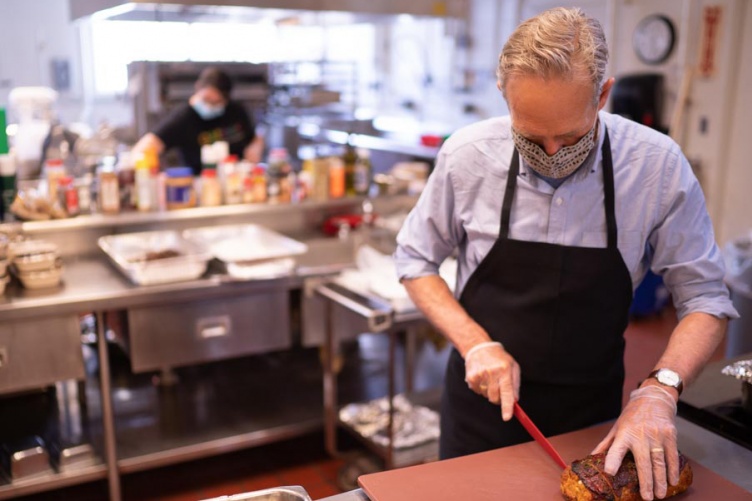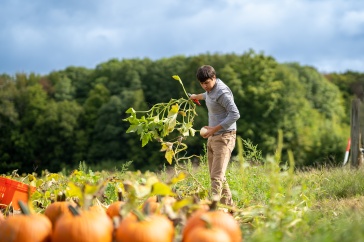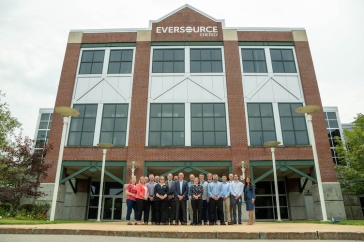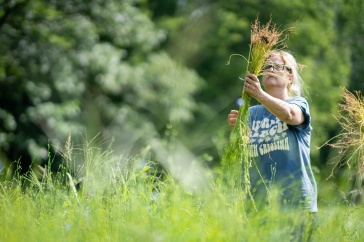
Dave Mortensen, professor and chair of the department of agriculture, nutrition and food systems, prepares meatloaf meals. Photo credit: Jeremy Gasowksi
According to the USDA, more than 80 billion pounds of food is wasted every year in the U.S., yet in 2019, more than 35 million people were food insecure — and that was before the pandemic.
One way to address hunger in the country seems obvious: figure out how to get the wholesome, edible food that is going into landfills into the hands of people who need it. COLSA’s department of agriculture, nutrition, and food systems (ANFS), UNH Hospitality Services, and Gather, a food pantry and food distribution network based in Portsmouth, are working together to do just that. The team is taking unused food from the UNH dining halls and donated food that would otherwise go to waste and transforming it into ready-to-eat meals for food insecure individuals and families in the greater New Hampshire Seacoast.
The symbiotic partnership draws from UNH Dining’s ongoing work to reduce food waste on campus, led by registered dietitian nutritionist Rochelle L’Italien ’88, Gather’s need for kitchen space to produce ready-to-eat meals for customers who lack access to cooking facilities and/or have mobility issues, and ANFS’s commitment, under the leadership of department chair David Mortensen, to extending its farm-to-fork-to-wellness mission beyond the classroom.

“This is an awesome project that needed to happen,” says Amy Taetzsch ’09, assistant clinical professor of nutrition and director of the master of nutritional science with dietetic internship. Taetzsch joined the team earlier this year and has been instrumental in moving the project forward. “We can have a lot of influence within the greater community, and I also see this project as impactful for our students. It’s important that they be actively engaged in our communities and not just focused on the academic side.”
Twice a week, Emily Gaddis, Gather’s project coordinator and the team chef, arrives at the Barton Hall teaching kitchen. With help from faculty, staff and student volunteers, ingredients like chicken, egg noodles, cherry tomatoes, snap peas, red onions and mushrooms become a zesty pasta primavera; ground turkey becomes hearty meatloaf; and chicken, cheese and pasta become a rich and flavorful buffalo chicken mac and cheese.
“I love the innovation, excitement, support and possibilities,” says Gaddis. “Many volunteers have little to no cooking experience so it’s a great way to teach some culinary skills while also fighting food insecurity, reducing food waste and building community engagement. There’s a lot of layers to what we’re doing.”
Once the meals leave UNH, they go to Gather’s pantry market and mobile markets for distribution. During the program’s pilot phase, launched in April 2021, the team produced 200-300 meals per week. They anticipate ramping up production in the fall and are working on a plan to expand distribution to food insecure students on campus.
“It’s gratifying to see the university leverage its resources and expertise and work with community partners to address pressing challenges — in this case hunger, healthy food access, sustainability and health on campus and beyond,” says Joanne Burke ’01G, clinical professor emerita and Gather board member. “We as a university community can make a significant difference in addressing food insecurity by redirecting healthy food to those with limited access.”
And how are people enjoying the meals?
“They love them!” says Gaddis. “They fly off the shelves.”
The food repurposing project needs volunteers! If you're interested in helping prepare and package meals for those in need, please contact Amy Taetzsch or check out this flyer.
This article will be published in the upcoming fall 2021 issue of the UNH College of Life Sciences and Agriculture's flagship print publication, THRIVE. Read our spring 2021 issue here.
-
Written By:
Sarah Schaier | College of Life Sciences and Agriculture
















































